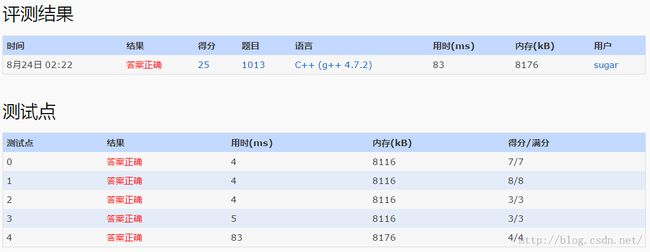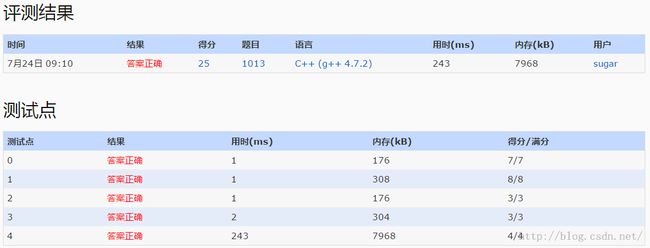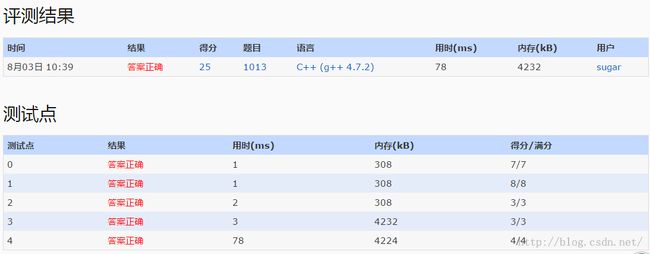1013. Battle Over Cities (25) DisjointSet & DFS 我的解法并不优雅
1013. Battle Over Cities (25)
It is vitally important to have all the cities connected by highways in a war. If a city is occupied by the enemy, all the highways from/toward that city are closed. We must know immediately if we need to repair any other highways to keep the rest of the cities connected. Given the map of cities which have all the remaining highways marked, you are supposed to tell the number of highways need to be repaired, quickly.
For example, if we have 3 cities and 2 highways connecting city1-city2 and city1-city3. Then if city1 is occupied by the enemy, we must have 1 highway repaired, that is the highway city2-city3.
Input
Each input file contains one test case. Each case starts with a line containing 3 numbers N (<1000), M and K, which are the total number of cities, the number of remaining highways, and the number of cities to be checked, respectively. Then M lines follow, each describes a highway by 2 integers, which are the numbers of the cities the highway connects. The cities are numbered from 1 to N. Finally there is a line containing K numbers, which represent the cities we concern.
Output
For each of the K cities, output in a line the number of highways need to be repaired if that city is lost.
Sample Input3 2 3 1 2 1 3 1 2 3Sample Output
1 0 0
# include <cstdio>
# include <cstring>
# include <algorithm>
using namespace std;
const int debug = 1;
const int _size = 1000+5;
class DisjointSet
{
private:
int *T,size,sum;
int FindRoot(int i){return T[i] < 0 ? i : (T[i] = FindRoot(T[i]));}
public:
DisjointSet(int _size):size(_size)
{
T = new int[size];
Init();
}
void Init(){sum = size;memset(T,-1,sizeof(int)*size);}
bool Unioned(int i,int j){return FindRoot(i)==FindRoot(j);}
void Union(int i,int j)
{
if ( (i = FindRoot(i) ) != ( j = FindRoot(j) ) )
{
T[i] = T[i] + T[j];
T[j] = i;
sum--;
}
}
int FindSum(int i){return -T[FindRoot(i)];}
int SumOfUnits(){return sum;}
~DisjointSet(){delete[] T;}
};
typedef pair <int ,int > edge;
edge e[_size*_size];
int main()
{
int i,j,tmp;
int n,m,k;
scanf("%d%d%d",&n,&m,&k);
for (i=0;i<m;i++)
{
int a,b;
scanf("%d%d",&a,&b);
e[i] = edge(a-1,b-1);
}
while (k--)
{
DisjointSet U(n);
scanf("%d",&tmp);
for (i=0;i<m;i++)
{
if (e[i].first!=tmp-1&&e[i].second!=tmp-1)
U.Union(e[i].first,e[i].second);
}
j = U.SumOfUnits();
printf("%d\n",j<=2?0:j-2);
}
return 0;
}

#include<iostream>
#include<string.h>
#include<string>
using namespace std;
struct node
{
int to;
int next;
}Edge[10000000];
int N,cnt,head[1001];
bool vis[1001];
void AddEdge(int u,int v)
{
Edge[cnt].to=v;
Edge[cnt].next=head[u];
head[u]=cnt++;
Edge[cnt].to=u;
Edge[cnt].next=head[v];
head[v]=cnt++;
}
void DFS(int u)
{
int i,v;
for(i=head[u];i!=-1;i=Edge[i].next)
{
v=Edge[i].to;
if(!vis[v])
{
vis[v]=true;
DFS(v);
}
}
}
int main()
{
int M,K,i,j;
int a,b;
while(cin>>N>>M>>K)
{
memset(head,-1,sizeof(head));
cnt=0;
for(i=0;i<M;++i)
{
cin>>a>>b;
AddEdge(a,b);
}
for(i=0;i<K;++i)
{
cin>>a;
memset(vis,0,sizeof(vis));
vis[a]=true;
cnt=0;
for(j=1;j<=N;++j)
{
if(!vis[j])
{
DFS(j);
cnt++;
}
}
cout<<cnt-1<<endl;
}
}
return 0;
}

# include <cstdio>
# include <cstring>
# include <iostream>
# include <set>
using namespace std;
# define _size (1000+5)
int min(int a,int b)
{
return a>b?b:a;
}
int n,m,k;
struct edge
{
int to;
edge *next;
edge(int _to):to(_to),next(NULL){}
};
struct vertex
{
int Index;
int Count;
vertex():Count(-1),Index(-1){}
};
vertex city[_size];
int Map[_size][_size];
int Index = 0;
void dfs(int loca,int root)
{//cout << "loca = " << loca << ' ' << "root = " << root << endl;
if (city[loca].Index==-1)
{
city[loca].Index = ++Index;
for (int i=1;i<=n;i++)
if (Map[loca][i]&&i!=root)
{
dfs(i,loca);
city[loca].Index = min(city[i].Index,city[loca].Index);
}
}
};
int main()
{
int i,j;
scanf("%d%d%d",&n,&m,&k);
for (i=0;i<m;i++)
{
int a,b;
scanf("%d%d",&a,&b);
Map[a][b] = Map[b][a] = 1;
}
int count = 0;
for (i=1;i<=n;i++)
if (city[i].Index==-1)
dfs(i,i),count++;
int Cnt[_size];
while (k--)
{
int temp;
scanf("%d",&temp);
int Sum = 0;
if (city[temp].Count==-1)
{
memset(Cnt,0,sizeof(Cnt));
for (i=1;i<=n;i++)
if (Map[temp][i]==1)
Cnt[city[i].Index] = 1;
for (i=1;i<=n;i++)
Sum += Cnt[i];
city[temp].Count = Sum;
}
Sum = city[temp].Count;
printf("%d\n",count + Sum - 2);
}
return 0;
}
